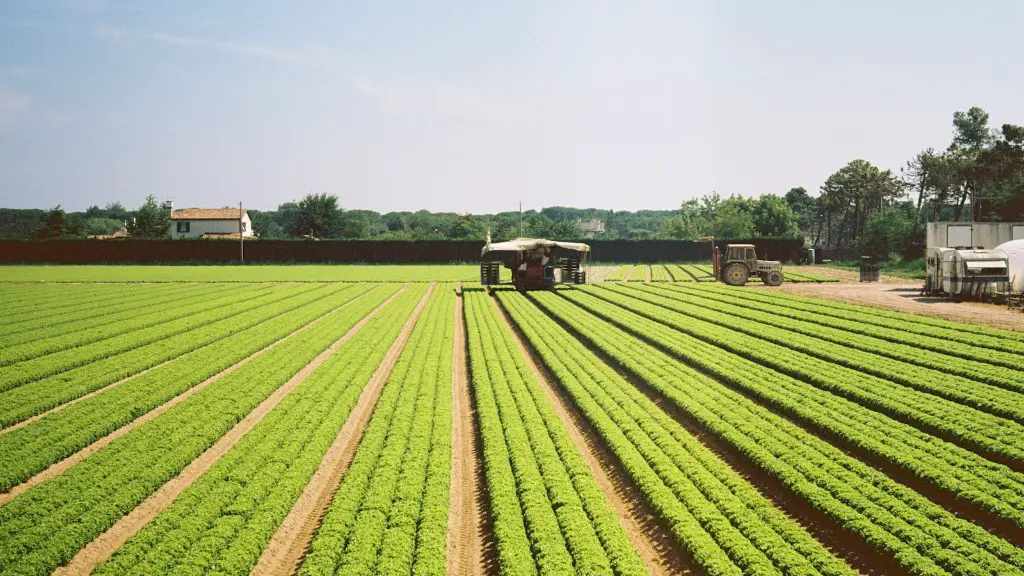Harvard is well-known for offering a wealth of academic opportunities to its students. This includes an array of programs in the field of agriculture, ranging from environmental management and sustainable farming to urban agriculture. Harvard’s programs in agriculture provide students with the chance to explore the cutting-edge of sustainable agriculture, with the potential to drive significant improvements in the way food is produced. So, does Harvard have an agriculture program? Absolutely.
Harvard’s College of Engineering houses a Department of Agriculture Engineering, which offers a wide variety of courses related to the field. These include courses in sustainable agriculture, food engineering, precision agriculture and agroecology, to name a few. This department also offers a range of degree options that range from a master’s in agricultural engineering to a doctorate in agricultural engineering. Additionally, the Harvard Environmental Science and Public Policy Program offers a diverse set of courses related to sustainable agriculture, allowing students to learn about a wide range of farming topics and explore how to implement sustainable farming practices.
Harvard is also home to a number of research institutes dedicated to discovering and creating solutions to the challenges of sustainable agriculture. These institutes focus on topics such as environmental management and biodiversity, water supply and pollution, and the sustainable use of natural resources. Harvard University’s Center for Agriculture, Food and the Environment brings together leading experts from the fields of agriculture, food and environment, to encourage innovative solutions to global challenges. The center is also responsible for promoting outreach initiatives that promote sustainable agriculture, such as sponsoring student farm visits and organizing workshops on food security.
Harvard also offers a number of opportunities for students to take part in research projects and internships related to sustainable agriculture. The Harvard Urban Agriculture Summer Internship Program is a great way for students to gain hands-on experience in urban farming and develop a deeper understanding of the challenges of urban agriculture. Additionally, the Harvard Center for Environment and the Humanities provides an array of programs and internships in sustainable agriculture, which involve research and outreach activities that enable students to gain an in-depth understanding of sustainability and food production.
Overall, it’s clear that Harvard offers a variety of opportunities for students to get involved in agriculture and food production. Through its various degree options and research institutes, as well as its outreach initiatives and internships, Harvard gives students the ability to pursue their interest in sustainable agriculture. So, if you’re interested in learning more about agricultural issues and exploring sustainable farming practices, consider taking a look at the many opportunities Harvard has to offer.
Environmental Management and Sustainable Farming
Harvard’s College of Engineering offers a Department of Agriculture Engineering, with a wide variety of courses related to the field, including sustainable agriculture, food engineering, precision agriculture and agroecology. These courses and degree options offer students the chance to learn about cutting-edge sustainable farming methods, as well as how to manage their environmental impact, conserve resources, and build healthy soil. Additionally, the Harvard Environmental Science and Public Policy Program provides students with a variety of courses related to sustainable agriculture, emphasizing the importance of ecological stewardship and food production.
Harvard also provides a number of research institutes, such as the Harvard Center for Agriculture, Food and the Environment, devoted to studying and promoting sustainable agriculture. These research bodies explore various methods of increasing agricultural productivity, ranging from biodiversity conservation and water resource management to using local sustainable agriculture to address global food insecurity. In addition, the Harvard Urban Agriculture Summer Internship Program provides students with the opportunity to gain practical experience in urban farming, which provides them with the necessary tools to implement sustainable practices on the ground.
Overall, Harvard’s programs in agriculture provide students with a wealth of support for engaging in sustainable farming practices. Through courses, degree options, research centers, and internships, Harvard’s students have access to knowledge and resources to become the leaders of a new agricultural revolution.
Urban Agriculture
Harvard is making great strides in its efforts to advance urban agriculture. The Harvard Urban Agriculture Summer Internship Program, for instance, offers students the chance to participate in hands-on research initiatives and gain direct experience in urban farming. Additionally, the Harvard Center for Agriculture, Food and the Environment encourages the development of sustainable agricultural policies and works to promote urban agriculture initiatives.
These initiatives are having a significant impact on communities. For example, students who have participated in the Harvard Urban Agriculture Summer Internship Program have gone on to establish urban farms in cities such as Boston, Los Angeles, and Washington D.C. These farms provide the surrounding communities with access to nutritious locally-grown produce, while also creating job opportunities and promoting the local economy.
Furthermore, Harvard is in the process of creating an Urban Agriculture Institute. This institute will place emphasis on the science, technology, and policy needed to strengthen urban agriculture. It will also actively seek to foster collaboration between city governments, research institutions, and local communities in order to promote the growth of urban food systems in an equitable, sustainable, and economically viable way.
Environmental Impact of Agriculture
Harvard’s programs in agriculture also emphasize the environmental impact of food production. The Harvard Center for Agriculture, Food and the Environment, for instance, works to study and identify potential environmental hazards associated with traditional farming techniques, while also exploring ways to reduce their environmental impact. Additionally, courses such as environmental management, water use, and biogeochemistry of soils provide students with the knowledge necessary to make informed decisions about agricultural practices.
Moreover, the Harvard Environmental Science and Public Policy Program promotes initiatives that aim to reduce the agricultural sector’s climate impact. This includes encouraging the adoption of sustainable energy sources for agricultural production, the development of precision agriculture to improve the efficiency of resources, and efforts to reduce food waste and food insecurity.
In general, Harvard’s programs in agriculture not only equip students with knowledge and skills to develop sustainable farming practices, but also provide them with an understanding of the environmental impacts associated with food production and the importance of conserving resources. By understanding the environmental effects of agriculture, students are equipped with the strategies and tools to create a sustainable agricultural future.
Economic Inequality and Food Security
Harvard’s programs in agriculture also work to address issues of economic inequality and food security. Through initiatives such as the Harvard Food Security Initiative and the Harvard Center for Agriculture and Food Security, students are educated on the struggles faced by many communities around the world, as well as the opportunities available to tackle these issues.
The Harvard Food Security Initiative, for instance, works to address food insecurity in developing countries by providing resources such as technical assistance, financial support and specialty food products to improve food security in vulnerable communities. This initiative has helped to develop successful agricultural business models and increase access to nutritious food in places such as India, Cambodia and Laos.
Additionally, the Harvard Center for Agriculture and Food Security provides students with the opportunity to explore the connection between economic inequality and food security. Through academic programs, research initiatives, and outreach activities, students learn about the root causes of food insecurity and the potential solutions available to increase access to nutritious food.
Overall, Harvard’s programs in agriculture offer students a unique opportunity to understand and explore the many aspects of food production and distribution, from sustainable agriculture practices and environmental stewardship to, food security and economic inequality. With all the tools and resources available at Harvard, students are well-equipped to become informed advocates and leaders for a more sustainable agricultural future.




